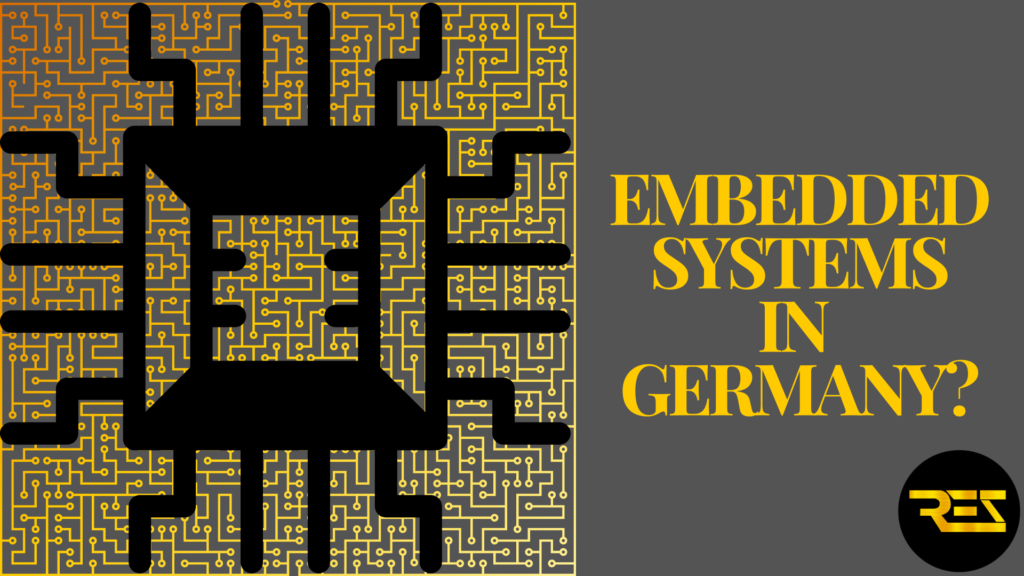MS in Embedded Systems in Germany

In 2024, modern marvels like your smartphone, GPS, and even your trusty microwave rely on a hidden technology called Embedded Systems. These intelligent devices seamlessly integrate computing power with hardware, making them efficient, adaptable, and ubiquitous in our daily lives.
Germany: A Hub for Embedded Systems Innovation
If you’re passionate about delving deeper into this dynamic field, Germany presents a compelling destination for your Master’s degree. Here’s why:
- Leader in Engineering and Innovation: Germany boasts a world-renowned education system and a thriving engineering sector. Earning your Master’s in Embedded Systems from a German university positions you at the forefront of technological advancements.
- Industry-Driven Education: German universities foster close collaboration with industry leaders. This ensures that programs reflect cutting-edge developments and equip you with the skills most sought after by employers.
- Focus on Practical Applications: German Master’s programs in Embedded Systems emphasize hands-on learning. Laboratory work, projects, and potential internships provide invaluable practical experience.
- Internationally Recognized Degrees: A German Master’s degree is a globally respected credential, giving you a competitive edge in the international job market.
- Scholarship Opportunities: Several scholarship options are available for international students, including DAAD scholarships and program-specific funding. These can significantly reduce your financial burden.
- Affordable Education: Compared to other Western countries, tuition fees for Master’s programs in Germany are generally lower. The cost of living can also be relatively affordable, especially in smaller cities.
Interested to pursue Higher Education in Germany?
Universities Leading the Way:
In 2024, Germany offers a rich academic landscape with numerous universities distinguished for their Embedded Systems programs. Here are a few examples:
- Chemnitz University of Technology
- University of Ravensburg-Weingarten
- Saarland University
- University of Duisburg, Essen
- University of applied sciences Bremerhaven
- Erasmus Mundus Program
- University of Freiburg
General Entry requirements to get admissions from these Universities:
-
Admission requirements may vary slightly between universities, but generally include:
- A Bachelor’s degree in a relevant field (e.g., Engineering, Physics, Computer Science) from a recognized university.
- Strong foundation in subjects like Mathematics, Physics, Informatics, and potentially specific courses like VHDL, Verilog, Signal Processing, and Information Theory (check program specifics).
- Proof of English language proficiency (typically IELTS 6.5+ or TOEFL 90+). While not always mandatory, a good GRE score (305+) can strengthen your application.
- A well-crafted personal statement outlining your academic background, career goals, and reasons for choosing the program.
- Updated CV showcasing your academic and professional experiences.
- Two recommendation letters from professors familiar with your academic achievements.
- Official academic transcripts.
- German language proficiency (A1 for English-taught programs, B2 for German-taught programs) is often required by the time of enrollment.
- Relevant work experience, if any, can be a valuable asset.
Beyond Academics:
- Cultural Enrichment: Germany offers a vibrant cultural tapestry with historic cities, breathtaking landscapes, and unique traditions. Studying abroad allows you to broaden your horizons and immerse yourself in this dynamic environment.
- Career Opportunities: Germany’s robust economy boasts a high demand for skilled professionals in the field of Embedded Systems. A Master’s degree from a German university positions you for success in the German job market or opens doors to exciting opportunities worldwide.
Possible occupation fields after MS in Embedded System in Germany:
A Master’s degree in Embedded Systems from Germany equips you for a diverse range of exciting career paths. Here are some prominent fields where your expertise will be highly sought after:
-
- Automotive Industry: Embedded systems are the backbone of modern vehicles, controlling everything from engine management to advanced driver-assistance systems. Germany’s world-renowned automotive sector presents a multitude of opportunities for graduates in this field.
- Bio & Medical Engineering: The convergence of engineering and medicine is fostering groundbreaking advancements. Embedded systems play a crucial role in medical devices, prosthetics, and diagnostic equipment.
- Automation: From industrial robotics to smart factories, embedded systems are revolutionizing automation processes.
- Energy Sector: As the focus shifts towards renewable energy and energy efficiency, embedded systems play a key role in smart grids, power generation, and energy management.
- Communication Technology: Embedded systems are vital for the infrastructure behind our interconnected world, including networking devices, routers, and communication protocols.
- Cybersecurity: With the growing reliance on connected devices, the need for robust security solutions is paramount. Skills in embedded systems are valuable for developing secure systems and protecting critical infrastructure.
- Multimedia Applications: Your expertise can be applied in developing cutting-edge consumer electronics, entertainment systems, and multimedia devices.
Case Study: Meet Priya, who wanted to pursue MS In Embedded System in Germany
Priya’s story exemplifies the pursuit of academic excellence without breaking the bank. For her, affordable tuition fees were paramount in choosing a country for her Master’s degree. Unlike many English-speaking countries known for their high costs, Germany emerged as a compelling option.
Understanding that financial stress can hinder academic success, Priya was further solidified in her desire for a financially accessible education after witnessing her cousin grapple with student loans in the US. Germany, with its reputation for lower tuition fees, presented a perfect fit.
Armed with this goal, Priya meticulously researched universities offering Master’s programs in Embedded Systems within Germany. She then carefully considered the entry requirements for each program, ensuring a good match with her qualifications. By strategically applying to only four universities that aligned with her aspirations, she maximized her chances of success. Receiving admissions offers from three universities was a testament to her diligence and preparation. Ultimately, she chose the Technische Universität Chemnitz (TU Chemnitz) to embark on her academic journey.
Fast forward two years, Priya’s decision proved to be a resounding success. She secured a job in Berlin, a city brimming with opportunities. Not only did her salary comfortably cover her living expenses, but she managed to save significantly – a remarkable feat of Rs. 10 lakhs annually. The prospect of a 25% annual salary increase further fueled her excitement.
While the salary might not have been astronomical, it provided financial freedom and a substantial nest egg. More importantly, it opened doors to international exposure and valuable work experience, experiences that wouldn’t have been readily available back in India.
Priya’s story serves as an inspiration for students seeking an affordable and rewarding Masters program abroad. By carefully planning and prioritizing affordability, international education and a successful career become achievable goals.
So, If you are like Priya you must contact us to help you in making your dream a reality.
Also, you could read about a comprehensive guide of what Reknown Edu Services offer as services.
FREQUENTLY ASKED QUESTIONS
How good is MS in Embedded Systems in Germany?
A Master’s in Embedded Systems in Germany is a top choice for several reasons:
-
- Excellent Education: German universities offer rigorous programs with strong industry ties.
- Research Powerhouse: Research opportunities rival top US universities.
- Consistent Quality: High standards are maintained across universities.
- Positive Reviews: Indian students report satisfaction with their education.
Germany provides a launchpad for success in the field of Embedded Systems.
What are the Job Opportunities after completing MS in Embedded Systems in Germany for Indians?
Job Market for MS in Embedded Systems (Germany) – Indians
-
- Strong Demand: The job market for Embedded Systems engineers in Germany is generally good, with high demand from various industries.
- Software vs. Hardware: While both hardware and software skills are valuable, job postings tend to skew towards embedded software engineers.
- Standing Out: A competitive job market requires showcasing your strengths. Consider internships, projects, and highlighting relevant skills to set yourself apart.
- Overall: An MS in Embedded Systems from Germany equips you with the skills and knowledge to find success in this dynamic field.
What is better, to work in a company after my UG in Electronics Engineering or pursuing MS in Embedded Systems?
Here’s a breakdown to help you decide between working after a UG in Electronics Engineering or pursuing an MS in Embedded Systems:
- Working after UG:
- Pros: Gain practical experience sooner, start earning a salary, potentially faster career progression within the company.
- Cons: Limited theoretical knowledge in a specialized field like Embedded Systems, might limit future career options requiring advanced knowledge.
- Pursuing MS in Embedded Systems:
- Pros: Deeper understanding of the field, opens doors to specialized roles in Embedded Systems, potentially higher earning potential in the long run.
- Cons: Delays entry into the workforce, additional educational costs.
- Here are some additional factors to consider:
- Your career goals: Do you have a specific interest in a niche area within Embedded Systems?
- Your learning style: Do you thrive in a practical work environment or benefit more from theoretical study?
- Job market: Research current job openings in your desired location to see if a Master’s degree is a requirement for specific roles.
- Overall, there’s no single “better” option. It depends on your individual circumstances and aspirations.
- Embedded Systems is indeed a crucial field with significant growth potential. While starting salaries might not be the highest, experienced engineers can command much higher salaries. An MS can provide a strong foundation and open doors to more specialized and potentially lucrative positions within the field.
How tough is MS In Embedded Systems in Germany?
- Expect a Challenge, Embrace the Support:
- An MS in Embedded Systems in Germany will undoubtedly test your academic mettle. The coursework can be demanding, requiring a strong foundation in electronics and a willingness to push yourself conceptually.
- However, you’re not alone in this journey:
- Supportive Professors: German universities are known for their approachable professors who are happy to answer questions and clarify doubts. Don’t hesitate to seek their guidance.
- Collaborative Learning: Working with classmates on projects can be a valuable learning experience. Teamwork fosters understanding and eases the workload.
- Online Resources: The internet offers a wealth of information and tutorials to supplement your studies. Just be mindful of plagiarism when working on assignments.
With dedication, perseverance, and utilizing the available support systems, you can successfully navigate the challenges of this rewarding program.

2 Responses
My UG specialisation was Mechatronics. Can I pursue this course in Germany?
Well, it is not going to be easy. You gotta convince the Admission committee why do you wanna pursue Embedded Systems? If you can substantiate the reasons coupled with the appropriate documents you have a chance for sure.